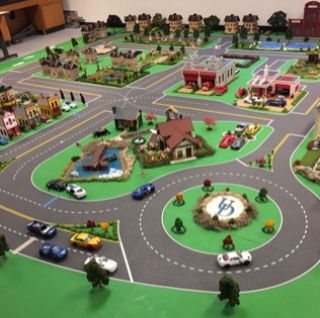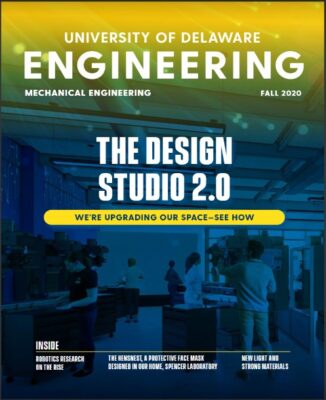In two recently established UD labs, Malikopoulos tests fuel-efficient, CAVs
Next time you buy a car, what will you look for? Most people want a model with automated features or better fuel economy than their current car, according to surveys from the American Automobile Association (AAA) and Consumer’s Union.
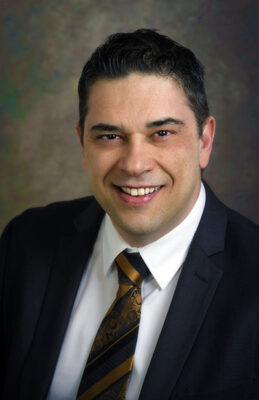
Andreas Malikopoulos, Mechanical Engineering.
In two new labs at the University of Delaware, these vehicles of the future are being put to the test.
Andreas Malikopoulos, who joined the University of Delaware’s Department of Mechanical Engineering in 2017, is researching ways to maximize fuel efficiency in a connected and automated vehicle (CAV). These vehicles use sensors, cameras and advanced control algorithms to adjust their operation to changing conditions with minimal or no driver input.
Malikopoulos, an associate professor, develops and implements control technologies to allow vehicles to bypass roadblocks, change speed based on traffic conditions, and adjust their powertrains to optimize efficiency.
Malikopoulos is the principal investigator of a $4.2 million, three-year project funded by the Advanced Research Projects Agency for Energy (ARPA-E) through its NEXT-Generation Energy Technologies for Connected and Automated On-Road Vehicles (NEXTCAR) program to improve the efficiency of an Audi A3 e-tron by at least 20 percent. The partners of this project are the University of Michigan, Boston University, Bosch Corporation, and Oak Ridge National Laboratory.
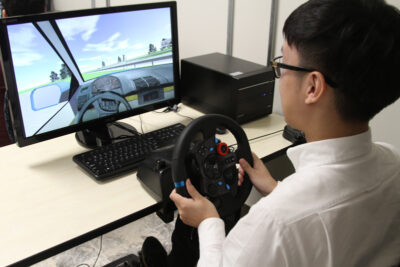
Researcher at driver simulation station.
ARPAE’s NEXTCAR program was established to advance connected and automated vehicle technologies to reduce energy consumption in these vehicles by 20 percent. These vehicle improvements could yield many benefits for Americans, including improvements to urban air quality and a reduced dependence on imported oil, the Department of Energy reports.
For this project, Malikopoulos established a new facility equipped with six driving simulators that can represent human-driven vehicles all linked together in a transportation environment. This environment can represent any city in the world and include CAVs at any desired penetration so that the interaction between CAVs and human-driven vehicles can be studied.
“Andreas is doing research that could help to shape the future of transportation,” said Ajay Prasad, chair of the Department of Mechanical Engineering. “UD mechanical engineers have a long history of innovation in safe, energy-efficient, zero-emission transportation, and Andreas is adding a new and important layer to our base of expertise.”
Malikopoulos also built a second laboratory, a small-scale (1:24) “smart” city that covers an area of 20 x 20 feet with about 35 robotic cars to replicate real-world traffic scenarios in a small and controlled environment. UD’s Scaled Smart City has model streets lined with buildings, equipped with traffic lights and dotted with pedestrians.
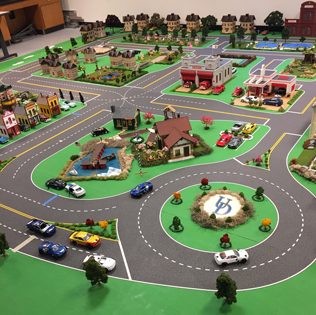
Scaled Smart City
Several UD graduate and undergraduate students along with high school students were involved in building UD’s Scaled Smart City this past summer under the mentorship of Malikopoulos.
Malikopoulos assigned Adam Stager, a doctoral student in the Department of Mechanical Engineering, to lead this team of undergraduate and high school students for this project.
“For me building UD’s Scale Smart City was the perfect opportunity to bring theory to reality,” Stager said. “In just a few months Prof. Malikopoulos’ contagious excitement helped him gather and mentor a diverse set of students who came together to design this truly state-of-the-art research platform. Working on this project has been a lot of fun and a wonderful learning experience.”
Luke Bhan, a senior at Avon Grove High School, has been working with Malikopoulos since June.
“The UD Scaled Smart City was a lifetime opportunity for me to get involved on a very timely project and see how technology and mathematics can address real-world problems,” Bhan said. “It has been an incredible learning experience doing research with Prof. Malikopoulos and Adam.”
Smart cities are designed to optimize energy and safety, and CAVs can help toward establishing energy efficient mobility systems. These vehicles convey information to each other in order to keep drivers, passengers, and pedestrians safe while delivering everyone to their destinations on time.
In UD’s Scaled Smart City, Malikopoulos tests new vehicle technologies on miniature models, without the costs and safety concerns that full-size vehicle tests would bring. The work in this testbed complements the results from the driving simulators. Malikopoulos and his students can use the simulators to develop algorithms and then use the miniature city’s hardware to test those algorithms. That helps him optimize the whole system.
“These are unique facilities that can help us visualize how eventually smart cities would look,” he said.
Malikopoulos also plans to collaborate with other faculty at UD and use UD’s Small Scale Smart City to study sociotechnical aspects of smart cities. If automotive transportation systems become more efficient, people then might eventually change their commuting habits.
For one, “we need to understand how travelers will change their behavior and provide the appropriate incentives that would yield a social system optimal behavior,” he said.
“In the UD College of Engineering, we are on the leading edge of research on smart cities,” said Babatunde Ogunnaike, dean of the College of Engineering. “Andreas brings a systems approach that will help establish UD further as one of the most innovative hubs of these activities.”
In addition, Malikopoulos has joined UD’s Center for Fuel Cells and Batteries, where researchers from across the College of Engineering collaborate to develop eco-friendly fuel technologies.
Before he joined UD, Malikopoulos was the deputy director and the lead of the Sustainable Mobility Theme of the Urban Dynamics Institute at Oak Ridge National Laboratory, and a senior researcher at General Motors Research & Development. Malikopoulos earned his doctoral degree in mechanical engineering from the University of Michigan, Ann Arbor.

